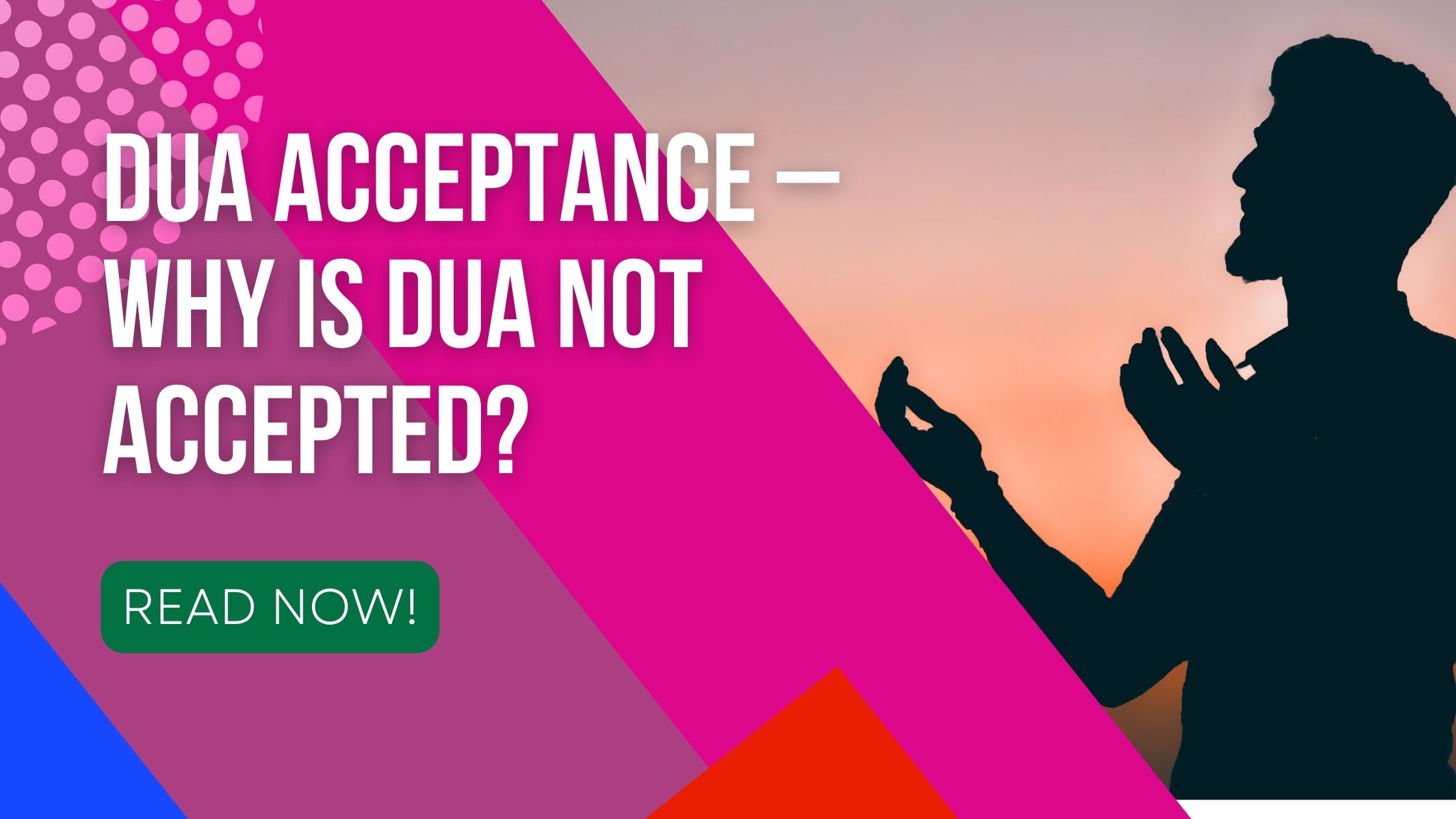Dua, or supplication, holds immense significance in Islam, representing a direct connection between believers and their Creator, Allah. The acceptance of duas is assured by Allah’s generosity and mercy, with believers encouraged to approach Him with sincerity, gratitude, and repentance.
Adhering to etiquettes of dua, such as evoking intentions, seeking forgiveness, and showing a sense of need, enhances the likelihood of acceptance. Various times and situations, including during prayer, in the last third of the night, and during moments of adversity, are highlighted as opportune for making dua.
While signs of dua acceptance may include a calm heart and positive visions or dreams, believers are urged to maintain patience and trust in Allah’s wisdom and benevolence.
Many Muslims make many Duas, then they wonder why their duas are not accepted. You can see the mentioned signs, and time of moe probable acceptence. If you are one of those who wonders, keep reading the following lines.
We are going to talk about the best times in which duas are answered, what to do to make your Duas accepted, and finally the signs of the accepted duas.
Table of Contents
When and How Are Duas Accepted?
Allah accepted the duas at every time and in all places. But you need to keep your heart connected with Allah and trust in Him.
Allah the most Merciful and the most Generous never let one of His servants raise their hands to heaven and turn them back empty-handed.
Salman al-Farsi reported: The Prophet, (peace and blessings be upon him) said, “Verily, Allah is conscientious and generous. He would be shy, when a man raises his hands to Him, to turn them away empty and disappointed.” al-Tirmidhī 3556
In another narration, with another meaning, Anas ibn Malik reported: “He would be shy for His servant to raise his hands to Him and then not place any goodness in either of them.”
Duas are accepted when we know for sure the Etiquettes of Duas and supplication. We have to learn and apply these Etiquettes. Let’s have a quick look.
Top 10 Duas Etiquettes:
As we raise our hands to make supplications and Duas to Allah, We need to observe the following etiquettes. Your Duas will be accepted when you do the following:
1. Start Your Dua by Thanking Allah
We should start our Duas by thanking Allah with His glorious name, then we should mention blessings prayers (salawat) upon our prophet Muhammad, after that we say the context of the Dau, then after finishing it we say Amen, three times, finally we end with saying again the prayers and blessings (Salawat) upon our prophet Muhammad one more time.
2. Evoke Intentions And True Faith
One needs to supplicate to Allah in certainty. Thus, the intention of prayers and supplications should be in true faith، and just for Allah. This helps to serve as a reminder for true Muslims.
3. Evoke Repentance
Repentance, with feelings of humility and shamelessness, should be invoked towards AllahThe Most Merciful.
4. Evoke Forgiveness
Seeking forgiveness before you make your Duas is a must. Therefore, your Duas will be accepted.
5. Evoke a Sense of In- Need
You have to Show deprivation and the sense of in-need to Allah The Highest. We were informed by Him in the Holy Quran: “When My servants ask you (O Prophet) about Me: (tell them that) I am truly near. I respond to one’s prayer when they call upon Me. So let them respond ˹with obedience˺ to Me and believe in Me, perhaps they will be guided (to the right path)” (Surah Al-Baqarah, Verse186)
6. Sense of Supplicating
Some scholars say that since the above-mentioned verse is placed in between two verses talking about rulings of fasting, it is then a sign of the merits of supplications and Duas for Allah.
7. The Comprehensive Supplications are Accepted
The Messenger of Allah ( peace and prayers be upon him) recommended comprehensive supplications (Al-Jawami’). It means supplications with very few words but its meanings are comprehensive.
Abu Dawud reported that the Messenger made many supplications that we did not memorize. We said to him: “O Messenger of Allah! You have made many supplications of which we do not remember anything.” He said, “Shall I tell you a comprehensive prayer? Say: (O Allah, I beg to You the good which Your Prophet Muhammad begged of You; and I seek refuge in You from the evil where from Your Prophet Muhammad sought refuge. You are the One from Whom help is sought and Your is the responsibility to communicate (the truth). There is no power or strength except with Allah the Exalted, the Great.”‘
8. Praying For You Brother Makes your Duas Accepted
The Messenger of Allah ( peace and prayers are upon him) said, “The supplication of a Muslim for his (Muslim) brother in his absence will certainly be answered. Every time he makes a supplication for good for his brother, the angel appointed for this particular task says: ‘A meen! May it be for you, too.” [Muslim]
9. Putting Halal Food on The Table Makes your Duas Accepted
It is narrated that Sa’d Ibn Abi Wqas asked the prophet to ask Allah for him to make his duas answer. The prophet told him to make the food he eat halal. Then he added that the Prayers of the one who eats a single morsel of haram are not accepted for forty nights nor are his invocations accepted for forty days. Though it may be a weak hadith, we can apply its context as long as it is in the worship section.
10. Patience makes Your Duas Answered
Abu Hurairah narrated that the Messenger ( peace and prayers are upon him) said, “Every one of you will have his supplications answered, as long as he is not impatient and he says: I have supplicated but I was not answered.”
Therefore, we should not be in a hurry for the Duas to be answered immediately when we make Duas.
You can also attend online Quran and Arabic Classes with Bayan al-Quran with Native Arab tutors. There are also several courses that can help you in this regard:
- Learn Quran Online With Tajweed For Kids And Adults
- Learn Arabic Online Course
- Islamic Studies Online Course
- Noorani Qaida Online Course For Kids And Adults
What are the Duas Acceptance Times?
The times when duas are accepted are the following:
1. The Last Third of The Night
Abu Huraira reported: The Messenger of Allah, (peace and blessings be upon him), said, “Our Lord Almighty descends to the lowest heaven in the last third of every night, saying: Who is calling upon Me that I may answer him? Who is asking from Me that I may give him? Who is seeking My forgiveness so that I may forgive him?”
2. After The daily Five Prayers
After we end our prayer (the prescribed prayer) and after finishing Tasbeeh, it is a good time for making duas.
3. The Time Between Adhan and Iqamah.
It is narrated that the Prophet (peace and blessings of Allah be upon him) said: “A du’a offered between the adhan and iqamah is not rejected.” At-Tirmidhi (212).
4. When The Call For The Prescribed Prayers is Announced
It is narrated that the Prophet Muhammad peace and blessings be upon him said, “Two (prayers) are not rejected, or seldom rejected: Prayer at the time of the call to prayer, and (the prayer) at the time of fighting, when the people grapple with each other.”
5. At Laylat al-Qadar Night
During the holy night of Laylatul Qadr,l duas are accepted. The Prophet (peace and blessings be upon him) said:
This month (of Ramadan) has begun and there is a night in it better than one thousand months. (So,) one deprived of its (blessings) is deprived of all goodness. Indeed, He is truly deprived who is kept away from its good.” Ibn Majah
6. When Rain falls
It is narrated that the companions and righteous people used to make duas while it was raining.
7. An Hour On Friday
The Messenger of Allah (peace and blessings be upon him) mentioned Friday and said: “ On Friday there is an hour when, if a Muslim happens to pray at that time and ask Allah for something good, He will give it to him” Bukhari, 935
8. The Moment You Drink Zamzam Water
Jabir (may Allah be pleased with him) narrated that the Prophet (peace and blessings be upon him) said: “Zamzam water is for that for which it is drunk.” Sahih al-Jami, 5502
9. Prostration (Suqood) Time
The Prophet (peace and blessings of Allah be upon him) said: “The closest that a person is to his Lord is when he is prostrating, so say plenty of du’a then.” Muslim, 482
10. Time of Visiting Someone Who is Sick
Umm Salamah said: The Prophet (peace and blessings be upon him) said: “ Whenever you visit the sick or the dead, supplicate for good because angels say” Amin” to whatever you say.” Sahih Muslim 919
11 During Ramadan Month, Duas are Not Rejected
Dua during Ramadan is fantastically important. Abu Huraira reported: The Messenger of Allah, (peace and blessings be upon him), The Prophet mentioned: “Indeed the prayer of the fasting person during his break is not rejected.” (Sunan Ibn Majah)
Also, Umar (may Allah be pleased with him) narrates that the Prophet said:
“Those who engage in remembering Allah on the days of Ramadan are cleansed of their sins, and those who wish from Allah are not left empty-handed.”
If you are interested in learning more about the favorable times to perform Dua, check out performing Dua before and after reciting the Quran.
Signs of Dua Acceptance – Two Main Signs That Your Dua is Accepted
In the texts of the Quran and Sunnah, we know that there are no signs of the accepted prayer ( Dua). However, some scholars have mentioned the following:
1. Calmness of Heart, Coldness of Aplomb
Ibn El Jizzari said Dua’s response signs are fear, crying, chills, maybe syncope, and nausea. The consequence is the calmness of the heart, the coldness of the aplomb, and the existence of activity. So that the caller thought he had a heavy weight on his shoulder, he put it off.
2. Good Visions and Dreams are Signs
Allah may send glad tidings for the caller in his night dreams. He, The Most Merciful, will send certain symbols for His servants in their dreams to tell them that their duas are accepted.
Learn the Quran Online With Bayan al-Quran Native Arab Tutors:
Embark on a transformative journey of Quranic learning with Bayan Al-Quran’s comprehensive online courses. Our platform offers an authentic and immersive experience tailored to learners worldwide. Whether you’re a beginner or seeking to enhance your skills, our Tajweed courses provide expert guidance and structured learning to master the art of Quranic recitation.
🎓 Expert Guidance:
Benefit from experienced instructors who specialize in Tajweed, breaking down complex rules into manageable segments for learners of all levels.
✨ Key Features:
- Structured, step-by-step learning approach.
- Access to high-quality instructional materials.
- Real-time feedback from qualified tutors to enhance your practice.
- Flexible learning schedules to accommodate your pace and convenience.
- Immerse yourself in the melodious tones of Quranic recitation, enriching your spiritual experience.
🌟 Why Choose Bayan Al-Quran?
Join our vibrant community dedicated to perfecting Quranic recitation. Build a profound connection with the divine words of the Quran and enrich your spiritual journey. Choose Bayan Al-Quran for a transformative learning experience and embark on a path to mastering Tajweed with confidence.
You can also attend online Quran Classes with Bayan al-Quran with Native Arab tutors. There are also several courses that can help you in this regard:
- Online Quran Classes For Kids
- Learn Arabic Online For Kids
- Islamic Studies Online Course
- Noorani Qaida Online Course For Kids And Adults
- Arabic Tutors Online
Conclusion
In conclusion, the acceptance of duas in Islam is a profound concept deeply rooted in the faith of believers. Allah, in His infinite mercy, responds to the sincere supplications of His servants, never turning them away empty-handed.
The etiquettes of dua outline the proper manner in which believers should approach Allah with their requests, including expressions of gratitude, repentance, and humility. Additionally, specific times and circumstances are highlighted as opportune moments when duas are more likely to be accepted, such as during the last third of the night, after prayers, and during moments of adversity.
While signs of dua acceptance may vary, believers are encouraged to maintain faith and patience, trusting in Allah’s wisdom and benevolence.
Those who aspire to receive Allah’s forgiveness of their past sins. Those who strive to achieve a higher position in the sight of Allah the most Wise should observe these times and etiquettes of duas mentioned above.
It is worth mentioning that there are no specific supplications or duas that we must read in these times. But this does not mean that there is no emphasis on making supplications in these sacred times.
We should do our best to increase our (worship) of Allah in these times because our prophet Muhammad (peace and prayers be upon him) said, “Supplication is worship” (At-Tirmizi)
In these times, Allah the Most Merciful sends down His Mercy that is manifested into His forgiveness, multiplied rewards, acceptance, and other blessings to His servants who they ask him for by supplications and Duas.

















